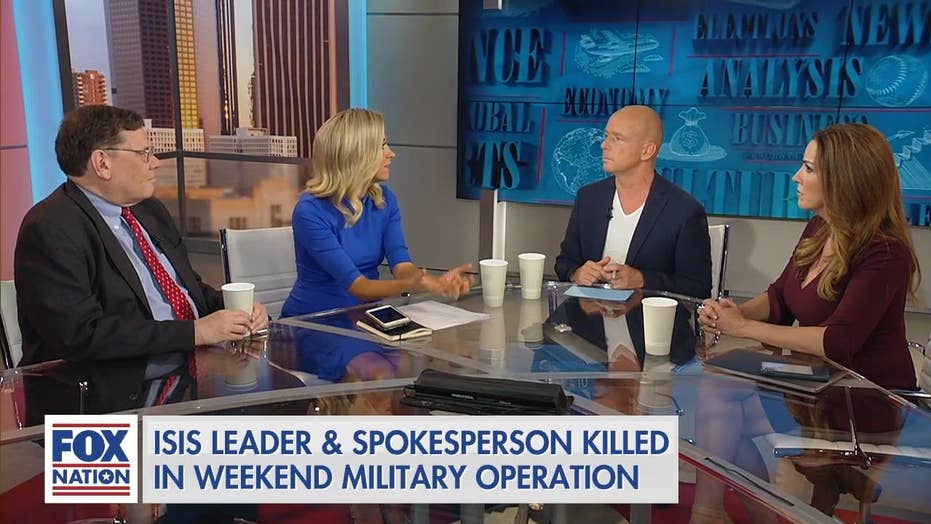It was astonishing to watch hapless Capitol Police not only be easily overwhelmed by a mostly unarmed rabble as they invaded the Capitol building, but some police so clearly ideologically aligned with the protesters who wanted to reverse the election in favor of Trump that they moved gates aside to let them pass and took selfies with them.
If the Roles Were Reversed, and ISIS Had Assassinated President Trump
After US special forces assassinated the head of the Islamic State, the reaction among American political officials, especially the president, and also journalists, was shocking. No one questioned illegality of the killing despite executive order 12,333, which specifically prohibits political assassinations by employees of the United States government. Journalist stupidly and openly asked the question of whether the group would now come to an end as a result. Overall, the reaction was shockingly callous and lawless.
The Killing of Abu Bakr al-Baghdadi: Illegal, Disgusting and Degenerate

As a society degenerates, life cheapens. The rhetoric that follows death coarsens. Respect paid to fallen rivals is replaced by triumphalism.
Historians observed this trend in ancient Rome. As republic turned to empire and domain expanded and so also arrogance and hubris, vanquished chieftains who previously might have been allowed to keep their thrones as the head of a vassal state were gruesomely executed at public triumphs. Early Christians got tossed to the lions. Gladiatorial combat became all the rage.
The assassination of Islamic State leader Abu Bakr al-Baghdadi by U.S. special forces operating under orders from President Trump reminds us that ours is a nation in moral decline—bloodthirsty and crass, functioning more like a vengeful crime family sending a message to its rivals than a nation of laws, a hell pit so devoid of basic ethics that it doesn’t even occur to its ruling party’s adversaries to raise the question of legality.
Nor does it cross the minds of journalists to mention the United States’ responsibility for the rise of ISIS. Rather than defend the secular socialist government of Bashar al-Assad or staying out of it, the Obama Administration armed and funded the Free Syria Army, parts of which allied with ISIS. This began the civil war. By most accounts al-Baghdadi was radicalized by his time in a hellish prison in U.S.-occupied Iraq—that’s on George W. Bush.
Inserting the caveat that ISIS committed many terrible crimes under al-Baghdadi ought not to be necessary here. Alas, such is the depth of our depravity that to omit such a mention is to risk being accused of approving of ISIS, its religious extremism, its kidnapping, enslavement, torturing and beheading because one suggests, as I do here, that a culture that had not lost its moral moorings would not tolerate what Trump did, what the media fails to question and what even those on what passes for the “left” not only tolerate but cheer.
So here: ISIS sucks. Moving on:
“Thank you and congratulations to our special operations forces and others involved in tracking and getting rid of ISIS/Daesh leader Baghdadi,” tweeted Tulsi Gabbard.
Getting rid of.
Gabbard is, by far, the least militaristic candidate for president.
“In tone and substance,” Vox noted, “the announcements of the deaths of Abu Bakr al-Baghdadi and Osama bin Laden couldn’t have been more different.” In 2011 Barack Obama used “nearly clinical tones” in his taped statement; Trump made fun of the dead jihadi, dubiously claiming that he left this world “whimpering and crying and screaming all the way” before detonating a suicide vest. He “died like a dog, died like a coward,” Trump told a press conference. Perhaps Caesar had something similarly classy to say about Vercingetorix.
If ISIS had been defeated as the president previously stated, the death of al-Baghdadi wasn’t a military victory. Worse than the BS was the undiluted repulsiveness of the president’s statement. Trump’s degeneracy did not spring out of thin air; rather, it was the culmination of his predecessors’ increasingly shameless contempt for the human lives we have given them the power to snuff out, and their discovery that holding up a severed head as a trophy can get you votes.
Obama played it cool. He put his surrogates in charge of his death-gloating. “If you are looking for a bumper sticker to sum up how President Obama has handled what we inherited, it’s pretty simple: Osama bin Laden is dead and General Motors is alive,” Vice President Joe Biden bragged as he stumped for Obama in 2012. No one in the media questioned the White House about the lack of legal justification for the operation.
“We came, we saw, he died,” Secretary of State Hillary Clinton cackled in 2011 after she watched on TV as a U.S. drone missile hit the Moammar Khaddafi’s car, driving him into the hands of American-armed radical Islamists who sodomized the Libyan leader with a bayonet. Running for president in 2016, she reminded audiences that she’d been in the Situation Room watching bin Laden being whacked.
“Good riddance,” George W. Bush said after Iraqi President Saddam Hussein was hung and decapitated. Bush invaded Iraq on the pretext that Saddam had weapons of mass destruction. In fact, Colin Powell admitted to associates that the evidence he presented in a ballyhooed speech to the United Nations was “bullshit.” Saddam never threatened the U.S. Impeaching Bush for conning America into war, Nancy Pelosi said in 2006, was “off the table.”
We have come a long way since 1981, when Ronald Reagan, a conservative Republican, signed Executive Order 12333, which states: “No person employed by or acting on behalf of the United States Government shall engage in, or conspire to engage in, assassination.”
E.O. 12333—which remains in force—was part of the aftermath of the Church Committee hearings of the 1970s, which exposed assassinations and other illegal acts committed by the CIA in Latin America and elsewhere at the height of the Cold War. American spooks conspired to murder political adversaries and heads of state, mainly on the left, all over the world. Back then, the political class had the grace to pretend to be ashamed.
When asked whether they had ordered extrajudicial assassinations, presidents of that era issued what came to be known as the Glomar response: they refused to confirm or deny. They would never have admitted, much less boasted about, murdering people. The press would never have looked the other way. If they had, the American people would not have tolerated either the politicians or the journalists.
(Ted Rall (Twitter: @tedrall), the political cartoonist, columnist and graphic novelist, is the author of “Francis: The People’s Pope.” You can support Ted’s hard-hitting political cartoons and columns and see his work first by sponsoring his work on Patreon.)
SYNDICATED COLUMN: Clinton Attacks Trump’s Lies…with Lies

Hillary Clinton’s strategists have identified Donald Trump’s innumerable lies as a major weakness in his campaign for president. They’re smart. Trump does lie a lot. He often gets caught lying. Voters want their next president to be trustworthy.
What the Clintonites and their allies in the media don’t seem to understand, however, is that if your attacks on your rival’s truthfulness are themselves based on lies, your efforts are doomed to failure.
In a recent op-ed column for the New York Times, Charles M. Blow wrote that Trump “is prone to making up his own set of false facts.” (Let’s leave aside the fact that, by definition, facts are true.)
“[Trump] wildly exaggerated the number of immigrants in this country illegally and ‘inner city’ crime rates,” Blow wrote. “He said President Obama founded ISIS and that the Obama administration was actively supporting Al Qaeda in Iraq, the terrorist group that became the Islamic State.”
I like Blow and often agree with him — though, for the life of me, I will never understand why he was so hard on Bernie Sanders during the Democratic primaries and so willing to excuse Hillary Clinton’s dismal record on issues of concern to African-Americans and LGBTQ people. Now he appears to have embraced the two-party trap, using his platform to bash Trump. That’s his right, of course. What I find fascinating is Blow’s willingness to resort to untruth to make his case for Hillary. Is it really so difficult to focus on Trump and his well-documented lies?
Consider the above quote, for example. It’s true that Trump said that there were 30 million illegal immigrants in the United States. (The real number is closer to 11 million.) Follow Blow’s link, however, and you find that he said that in July 2015 – well over a year ago. Nowadays, he acknowledges the widely accepted 11 million figure, albeit with the caveat that government statistics shouldn’t be trusted because they are compiled by incompetents. “Our government has no idea. It could be three million. It could be 30 million,” he said recently.
Trump is right. It’s impossible to know for sure, although the range is probably narrower than his example. The point is, the Times and Charles Blow willfully misrepresented Trump’s position by dragging up an ancient quote, since corrected. It’s the kind of thing Trump does, and it’s sleazy.
Similarly, it’s a stretch to say that Trump “wildly exaggerated” inner-city crime rates. Politifact has backed away from their previous assessment that he had lied about an uptick in urban crime. It’s pretty clear that Trump was referring to the widely reported rise in crime in cities like Chicago. The media has seized upon his use of the modifier “record” in the phrase “record high”; while crime has indeed been higher historically, shootings have spiked in places like Chicago.
The Islamic State claim is particularly unworthy of a storied newspaper like the New York Times. When Donald Trump called President Obama “the founder of ISIS,” it’s obvious to everyone what he meant. He was being colloquial. He was speaking like a normal person. Obviously Obama wasn’t literally at the founding of ISIS. Trump meant that Obama’s policies – namely his financing and arming of the radical Islamic fundamentalists in Syria’s civil war, a faction of which became ISIS, and the drawdown of U.S. troops from Iraq which created a vacuum of power — effectively created the group as the monster that we know it as today. Many Middle East experts agree with this assessment, as do mainstream political observers, including some who oppose Trump. Blow’s nitpicking is unbecoming, inaccurate and so transparent as to be totally ineffectual.
Another Times columnist, Frank Bruni, recently repeated the oft-cited claim that Trump treasonously “encouraged” Russian hackers to steal U.S. government records and interfere with the election when he sarcastically suggested: “Russia, if you’re listening, I hope you’re able to find the 30,000 [Hillary Clinton State Department] emails that are missing.”
Give me a break. I’m not going to vote for The Donald. I think he’s dangerous. But everyone knows exactly what he meant. He wasn’t encouraging Russian hacking. He was making a point in a humorous way: that it’s ridiculous and frustrating that Secretary Clinton got away with deleting so many public records.
Why are Hillary’s people resorting to the exact same style of lying that they claim to criticize? I don’t know if it’s because the truth of some claim is of little concern to them compared to it possible effectiveness, or if it’s because they believe that the numerous legitimate criticisms of Trump — his breathtaking ignorance of history and politics, his glib encouragement of violence at his rallies, his inexperience in government, his authoritarian tendencies — are unlikely to get much traction.
What I do know is that, unlike Trump, they aren’t fooling anyone.
(Ted Rall is author of “Trump: A Graphic Biography,” an examination of the life of the Republican presidential nominee in comics form.)
First They Came for the Chairs
The media went crazy over false reports that Bernie Sanders supporters threw some chairs at a Democratic convention in Nevada. They deplored the burning of Make America Great Again hats at a Trump rally. Meanwhile, Hillary Clinton personally destroyed several Middle East nations…yet the media doesn’t have anything to say about that.
On The Perils of Being No. 2 at ISIS
Originally published by ANewDomain.net:
Used to be “Al Qaeda’s number two” man was constantly getting killed, or reportedly getting killed, by the United States. Now the same pattern is repeating itself, but with the Islamic State of Iraq and Syria (ISIS) in the crosshairs. How will this affect the internal office politics of ISIS?
Why Would Anyone Want To Join ISIS?
Originally published by ANewDomain.net:
They slash innocent people’s throats. They hew off heads. They rape children, sell women into slavery and vandalize ancient museum pieces. Why would anyone want to join ISIS?
That’s the big question Americans and people in other Western countries are asking — because thousands of their citizens, many of them well-educated and reportedly of sound mind and body, are doing just that.
Unfortunately, mainstream media outlets seem unwilling and/or unable to explain the attraction of the Islamic State of Iraq and Syria. Even when the topic is broached, as it was recently on syndicated talk host Diane Rehm’s NPR radio show, so-called experts can’t or won’t answer the question, instead repeating the usual ISIS-is-incomprehensibly-evil memes we’ve already heard a zillion times.
“I think one characteristic that we see from ISIS is that they pursue every avenue. They have a specific recruitment for women, they have specific recruitment for different countries, different languages. They’re really unusually large for a terror group ,” Jessica Stern told Rehm.
Others say ISIS recruits are thrill-seekers or alienated youths searching for meaning in otherwise empty lives, as The International Business Times argued recently.
If ISIS is America’s enemy, or at least a phenomenon it would be in our interest to weaken or destroy, it is not in our interest to dismiss its adherents as fools, lunatics or alienated losers. Underestimating your adversary plays into his hands. They’re not crazy, and they come from all walks of life: “Four decades of psychological research on who becomes a terrorist and why hasn’t yet produced any profile,” John Horgan, director of the Center for Terrorism and Security Studies at the University of Massachusetts Lowell, told The Guardian.
Before we attack the Islamic State — OK, it’s too late for that — it behooves us to understand it. Which requires understanding its appeal.
ISIS is a Nation-State.
Corporate media outlets like NPR call ISIS “the self-proclaimed Islamic State” or “self-described Islamic State” as if the predicate weakens ISIS’ legitimacy. Ridiculous! You could apply the same lame undermining modifier to any nation: the self-described United States of America, the self-proclaimed Republic of Ireland, whatever. Nations exist until they don’t; ISIS has no less de facto legitimacy than, say, Panama.
No one knows whether ISIS will survive, but it is the first serious attempt to carve out an Islamist nation-state in memory.
ISIS isn’t like Al Qaeda and its spinoff groups, or Abu Sayyaf, Al Shabab and Boko Haram (which recently pledged fealty to ISIS). Those are underground insurgent organizations. They carry out attacks against government and private targets in territory that they do not control. A closer analogy is the Taliban, whose formal name during their rule ISIS echoes: The Islamic Emirate of Afghanistan — but it’s not a perfect one because, since 2001, “Taliban-held” areas of Afghanistan have been partially held and transited by troops loyal to the Kabul-based central government.
ISIS is trying to build a full-fledged nation-state with all the trappings: discrete borders, coins, stamps, its own monetary system, ministries, control and expansion of infrastructure, educational curriculum, a standing army, social programs, a judiciary, and not least — a cool flag.
“This is more than just fighting,” an ISIS recruit explains on an online video. “We need the engineers, we need doctors, we need professionals … There is a role for everybody.”
ISIS’ message — join us! we aren’t thinking about building a fundamentalist Muslim society, or trying to transform an existing Muslim country, but we’re actually making one now — excites Sunni purists currently living in Western countries or in Muslim nations like Saudi Arabia and Pakistan, whose leaders and values have been corrupted by Western and American influence. France, Germany and other countries with large populations of young Muslim immigrants have marginalized them in ghettos with high unemployment, subjecting them to racial profiling and harassment. They haven’t been made to feel at home. ISIS promises them they will be with them.
Ironically, it’s an appeal familiar to Jews who emigrate to Israel.
ISIS is a Caliphate.
Western commentators as well as some Muslim scholars scoff at ISIS’ claim to have reestablished the Islamic caliphate eliminated along with the dissolution of the Ottoman Empire after its defeat in World War I. ISIS’ caliph, Abu Bakr al-Baghdadi, is a shadowy Iraqi religious scholar turned jihadi who did time as a U.S. detainee — so what, they ask, is the basis of his legitimacy? Al-Baghdadi probably isn’t, despite his claims, a direct descendant of the prophet Mohammed, which according to classical scholars is required to be named caliph.
The naysayers are missing the point. “All that the Islamic State lacks is the legitimacy derived from mutual international recognition by other states, which it never sought in the first place. It also realized that states in the Muslim world resist its declaration of the Caliphate. Its legitimacy emerges from declaring a Caliphate and a state apparatus to sustain it, thus deriving legitimacy from a small, but devoted core of Muslims around the world, willing to leave their lives behind to travel and become citizens of the new Islamic State,” says Cal State historian Ibrahim al-Marashi.
To echo Nike, this is a “just do it” thing — you’re the caliph if you say you are, and enough people believe you to back you up.
The demise of the caliphate in 1924 stripped Islam of its centuries-old central governing body. Imagine, for example, how Roman Catholicism would be affected by the end of the papacy: new sects would break off, splinterism would rule, no one would agree on what a real Catholic believes or does. The desire to reestablish cohesion — under, of course, radical Sunnism — motivates Muslim fundamentalists who, such as Osama bin Laden, have long called for its restoration.
A caliph, however, is not a pope. He is a religious, military and political leader, all wrapped up in one — and God’s representative on earth. By definition, all Muslims are required to swear allegiance to a caliph and follow his dictates, or be branded apostates, and face death.
ISIS Kills Its Enemies. A Lot.
For ISIS, violence — slave markets, ethnic cleansing, mass slaughter, even of fellow Sunni Muslims — is not merely an unpleasant but necessary tactic, but an end in and of itself.
It’s not just rule by fear, though ISIS leaders use that too, as when they execute deserters by crucifixion. Like the Hotel California, ISIS is a place you can check in but never leave.
The brutality turns off some fighters enough to prompt them to flee, but for many others, it’s a major attraction. Slaughtering Shias, secular Sunnis and non-Muslims serves a double purpose: purification and revenge. For as long as most Muslims can remember — and this goes for liberal-minded Muslims too — they have been on the receiving end of violence: Israel, created by the U.S. and European powers from stolen Palestinian land. Iran, Saudi Arabia, Pakistan, Yemen and countless other Muslim nations oppressed by U.S.-backed tyrants. After 9/11: secret prisons, kidnappings, torture, drone assassinations, multiple invasions, constant bombing.
ISIS offers humiliated fighters a chance to lash out…even if swimming in the blood of a captured Yazidi woman is a poor substitute for an American drone operator, or a congressman.
It will take more than intercepting recruits on their way to Syria and arresting them, or cheesy, hollow appeals to patriotic sentimentality, to counter these powerful motivating forces.
“Born and raised in the United States, allegedly turned his back on his country and attempted to travel to Syria in order to join a terrorist organization,” said Loretta Lynch, Obama’s nominee for attorney general after the arrest of a Florida air force vet charged with trying to join the Islamic State. “An American citizen and former member of our military allegedly abandoned his allegiance to the United States and sought to provide material support to ISIL,” said assistant attorney general John Carlin.
There will be more like him.
A Closer Look: Why ISIS Is Destroying Historical Treasures
Originally published by Breaking Modern:
The Islamic State of Iraq and Syria (ISIS) has turned its destructive attention against archaeological treasures – and it’s partly our fault.
This week the United Nations called ISIS’ destruction of the 2,000-year-old Parthian city of Hatra a war crime. This follows reports that ISIS blew up the ancient Assyrian capital city of Dur Sharrukin and Nimrud, “known as Calah or Kalhu in the Bible … capital of the Neo-Assyrian Empire, which flourished under King Ashurnasirpal II in the First Millennium BC.”

The group released a video of its members taking sledgehammers and electric drills to antiquities on display at the museum at Mosul, currently under ISIS rule. Looting of archaeological sites is rampant.
The cradle of Western civilization is losing buildings and artifacts that have survived countless invading armies. The loss is staggering, incomprehensible and irreplaceable.
There are several motivations behind what the United Nations Educational, Scientific and Cultural Organization (UNESCO) calls “cultural cleansing.”
One is economic.
“ISIS is said to be encouraging civilians to plunder historic sites, and charging a 20% tax on anything they sell. Intelligence officials say looting is the terror group’s second largest source of income after oil,” according to New York Magazine.
If we are to take ISIS at its word, there is also a religious motivation. According to at least one video released by the group, the destruction is an attempt to carry out Islamic law. “A man in the video says the Prophet Mohammed ordered to get rid of statues and relics, and that the objects are idols for Assyrians and Akkadians,” reports RT.
But there is a deeper underlying reason that radical Islamists have declared war on historically significant relics under their control – one that most Western journalists are too deeply embedded within their own culture and political paradigm to discern.
Cornell archaeologist Sturt Manning speaks for many when he tells CNN that the problem is ignorance.
Manning suggests that maybe the ISIS guys simply don’t understand why history and archaeology matter:
The destruction eloquently speaks of the human folly and senseless violence that drives ISIS. The terror group is destroying the evidence of the great history of Iraq; it has to, as this history attests to a rich alternative to its barbaric nihilism.”

Never believe people who tell you that other people’s behavior has no rational explanation, that they are “senseless” or nihilistic. People do things for a reason. Just because you don’t know what it is doesn’t mean that it doesn’t exist. In the case of ISIS, many of its members are Western-educated and highly intelligent. They know what they are doing.
Manning’s conclusion that “Providing educational opportunities and empowering communities to learn more about their cultures and histories, and those of others, is one of the best ways to eradicate destructive hatred and violence,” is facile and lazy and in no way explains what’s going on in Iraq and Syria.
In addition to the religious and financial motivations, these acts – like the 2001 bombing by the Taliban of the giant Buddhas at Bamiyan – are cries for attention by people who have been completely marginalized from the international system.
We were smarter before 9/11.

Writing in USA Today in March 2001, W.L. Rathje noted that Sunni Islam’s strictures against idolatry turned against statues that had survived centuries of Muslim occupation in large part as a way of getting the attention of the West:
Probably most important, the Taliban government for more than a year has been requesting international humanitarian aid for a country ravaged by drought, earthquakes, and war. No aid is forthcoming as long as the Taliban harbor international terrorists such as Osama bin Laden, an anathema to key voting members of the UN Security Council, including the United States, Russia (where the Taliban are working with the Chechnyan [sic] rebels), and China (where the Taliban are active among Muslim separatists).
As the Taliban see it, the UN and others (such as New York’s Metropolitan Museum of Art, the British Museum, Taiwan’s National Palace Museum, and even such Taliban friends as Iran, Pakistan, and Sri Lanka) will give millions of dollars to save un-Islamic stone statues but not one cent to save the lives of Afghani [sic] men, women, and children.
It is not America and the West’s air war against the Islamic State that is prompting its attacks against archaeological treasures. It is the way that it is being carried out: using remote control drone aircraft whose downing cannot hurt a single pilot, laser-guided missiles fired by high-altitude fighter jets far out of reach of antiaircraft guns — not really a war at all but a one-sided onslaught in which the US-led coalition brutalizes an adversary that has 0.00% chance of fighting back.
Like the Taliban in 2001 at the time of the Buddha bombings, ISIS has nothing to lose.
As Machiavelli wrote hundreds of years ago in a book that ought to have been read by the signers of the Treaty of Versailles, nothing is more dangerous than an enemy backed into a corner. It is always wise, he counseled, to allow a graceful exit – and to be willing to negotiate. Especially when you are going to win.
Arrogance and technology are merging to create a post-democratic America accountable to no one, not even its own citizens, and thus impossible to talk to.
As Chamayou writes in A Theory of the Drone:
A sovereign, given that he never places himself in danger in the war, ‘can thus decide on war, without any significant reason, as a kind of amusement’ or hunting party … in a republican regime the situation is different” since “the consent of the citizens is required to decide whether or not war is to be declared.”
Chamayou argues that the “dronization” of American warfare – riskless attacks using unmanned aerial vehicles in distant lands – undermines this fundamental precept of representative government, that a United States that fights wars without the consent or even discussion of its citizens is no longer a democracy.

If you think that’s terrifying, and I do, imagine how it looks on the ground in Iraq and Syria. Like them or not – and I don’t – the leaders of the Islamic State know that they cannot and will not ever have a seat at the table with a mega-superpower that demands unconditional surrender and refuses to negotiate with terrorists.
That was the situation in 2001. The Taliban controlled 95 percent of the territory of Afghanistan, and had been in effective control of the vast majority of the nation since 1996, yet the United States and therefore the world refused to acknowledge them as a legitimate government.
They weren’t stakeholders in the international community.
They were outlaws, outliers, rōnin. Like North Korea today, they were an isolated regime whose only way of getting headlines and attention from Western leaders was by lashing out.
It may well be that economic and trade sanctions and a unilateral air war designed to completely isolate ISIS is the correct path to drive them out of power – though it didn’t work against the Taliban in Afghanistan. But, until that happens, don’t be at all surprised if these policies contribute to the decision of radical Islamists to take bulldozers to the world’s most precious archaeological artifacts.






